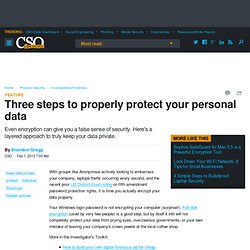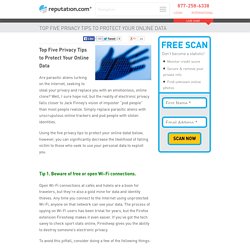

Three steps to properly protect your personal data. With groups like Anonymous actively looking to embarrass your company, laptops thefts occurring every second, and the recent poor US District Court ruling on fifth amendment password protection rights, it is time you actually encrypt your data properly.

Your Windows login password is not encrypting your computer (surprise!). Full-disk encryption (used by very few people) is a good step, but by itself it still will not completely protect your data from prying eyes, overzealous governments, or your own mistake of leaving your company's crown jewels at the local coffee shop. More in the Investigator's Toolkit: Instead—as with many successful security designs—you can set up a layered approach to protecting your data with encryption.
It's fairly easy, quick, and free. To create a more complete protection scheme, I am going to walk you through three steps to build this layered security approach: Step one: Install full-disk encryption Now follow the instructions and create a strong password. How To Protect Your Personal Data: 10 Ways To Keep Your Info Safe. Internet security: 10 ways to keep your personal data safe from online snoopers.
When Tim Berners-Lee was designing the technology that has transformed our world, he looked for a noun that would describe what he had in mind.

The one he eventually settled on was "web", which is how the world wide web got its name. To its inventor, the noun must have seemed perfectly apposite: it described the intricate, organic linking of sites and pages that he had in mind. But "web" has other, metaphorical, connotations. Webs are things that spiders weave with the aim of capturing prey. And if you want a metaphor for thinking about where we are now with networked technology, here's one to ponder. Imagine a gigantic, global web in which are trapped upwards of two billion flies. We are those insects. What's astonishing is how unconcerned many people appear to be about this.
What this means is that no form of electronic communication handled by commercial companies can now be assumed to be secure. 1 Email Rethink your email setup. 2 Encryption 3 Web browsing 4 Cloud services. Top five privacy tips to protect your online data. Top Five Privacy Tips to Protect Your Online Data Are parasitic aliens lurking on the Internet, seeking to steal your privacy and replace you with an emotionless, online clone?

Well, I sure hope not, but the reality of electronic privacy falls closer to Jack Finney’s vision of imposter “pod people” than most people realize. Simply replace parasitic aliens with unscrupulous online trackers and pod people with stolen identities. Using the five privacy tips to protect your online datat below, however, you can significantly decrease the likelihood of falling victim to those who seek to use your personal data to exploit you.
Tip 1. Open Wi-Fi connections at cafés and hotels are a boon for travelers, but they’re also a gold mine for data and identity thieves. To avoid this pitfall, consider doing a few of the following things: Tip 2. In the past most viruses targeted your operating system, but nowadays the browser is the bigger prize for hackers. Tip 3. Tip 4. How to defend your privacy online.